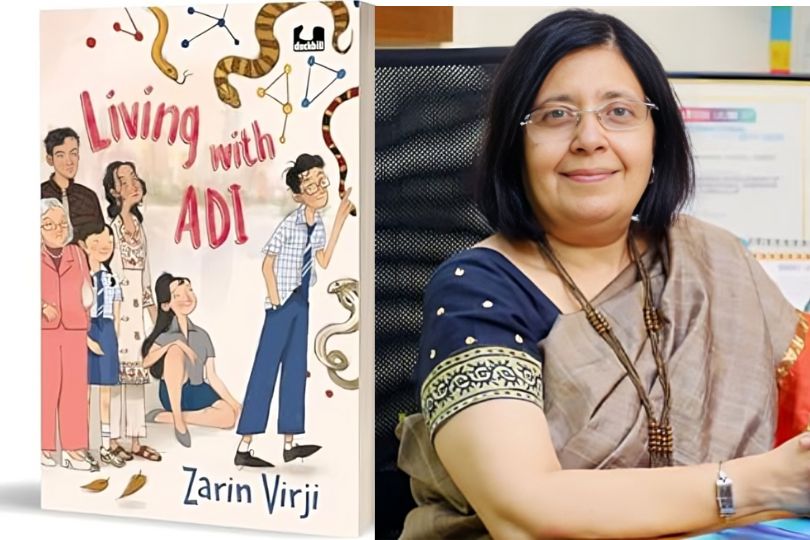Interview with Zarin Virji, Author “Living with Adi”
Exclusive interview with Zarin Virji, author of "Living with Adi," discussing the inspiration and journey behind her heartfelt and insightful book.on Jul 25, 2024

Zarin Virji, a creative writing graduate from the University of Sheffield, follows her passions of teaching and writing. For over three decades she has played the role of a teacher, teacher trainer and head of school. From 1996 to 2006, she edited the journal Classroom, a safe space for all matters related to education. Her writing is as much about expressing spontaneous feeling as it is about grappling with socio-economic realities of our times. Her poetry and short stories have been featured in publications such as the Research Scholar, Route 57 and The Best Asian Short Stories (2018).
Frontlist: Adi Krishnan is portrayed as a bright student with a unique perspective. How did you ensure that his character was nuanced and multidimensional, going beyond stereotypes of "nerdy" or "outsider" characters?
Zarin: It's true, avoiding stereotypes was crucial for me. When you spend as much time as I have with children, you realize how each one is a universe unto themselves. Adi isn't just a bright student; he's someone with layers and complexities, just like any real person. I drew inspiration from the countless students I've encountered over the years, each with their own quirks, passions, and challenges. By tapping into this richness of human experience, I aimed to create a character who feels authentic and relatable, and isn’t confined by stereotypes.
Frontlist: Drawing from your extensive experience in education, how have interactions with students and colleagues influenced your storytelling approach and thematic choices in "Living with Adi"?
Zarin: When you’ve spent more than three decades in schools, you’ve seen it all. I’ve seen teachers who are compassionate and those who aren’t, I’ve had students in all shades and I’ve met with parents who are exemplary as well as parents who don’t understand the first thing about parenting. While no one experience has influenced my approach to the book, it’s the amalgamation of these stories that led to the themes chosen.
Frontlist: The story is narrated from multiple viewpoints, including Adi, his family, classmates, and a teacher. How did you navigate switching between these perspectives to provide a comprehensive understanding of Adi's experiences?
Zarin: Sounding authentic from multiple viewpoints was my biggest challenge. A story comes to life for me when characters begin to speak to me in their unique voice. The key for me was authenticity. Each character had to feel real, with their own motivations, fears, and desires. I spent time immersing myself in their minds, understanding what drove them and how they perceived the world around them. The role of the character helped me to find their voice and then I had to ensure staying true to that voice and that point of view to provide a 360-degree view of Adi. I must not forget to thank my editor, Sayoni Basu, who steered me in the right direction.
Frontlist: Adi is described as "different" and labeled a "weirdo" by his peers. How can your book help students understand and celebrate neurodiversity in the classroom?
Zarin: My attempt in the book is to show that every child is unique. I believe that it's crucial for parents and teachers to recognize and embrace these differences, rather than attempting to fit every child into a mold and comparing them to their siblings or classmates. Neurodiversity occurs on a spectrum that encompasses a wide range of experiences and abilities. I hope that my book will help students to respect differences and be more inclusive, whether in the classroom or on the sports field.
Frontlist: Adi's relationship with his father is complex. How can the book be a resource for parents who may have children facing similar challenges of social acceptance?
Zarin: Perhaps more so in fathers than mothers is the denial that anything is wrong with their child. Based on this denial, they tend to reject their children if they do not measure up to the conventional standards. This rejection emanates from guilt about their part in what went wrong. Parents need to accept their children wholeheartedly, regardless of their flaws. And I know that isn’t easy, but who said parenting is an easy job? While all of us make mistakes, if love and trust are the foundation of this relationship, all is not lost. Also, parents need to be on the same page in bringing up their children. And Indian society needs to shed the stigma around seeking professional help.
Frontlist: Many students experience anxiety around a new school year. What advice would you give to young readers who may be feeling nervous or apprehensive about returning to school?
Zarin: Thanks to social media, students want to fit into the ‘cool’ and ‘with it’ persona, leading to unnecessary anxiety. I would ask young people to appreciate the uniqueness they bring to the table and not be driven by the idea of perfection. In fact, we all need to remind ourselves that we are imperfect beings trying to make sense of a vastly evolving world. This will come naturally when true self-esteem has been nurtured from the time of their birth.
In addition, friendships between people who are unlike one another can be enriching once we cross the initial barriers. Pro tip: friendships, as well as other relationships require being honest with one another, and work best when they are more about ‘give’ rather than ‘take’.



.jpg)






.jpg)
.png)
.jpg)
.jpg)
.jpg)
.jpg)
.jpg)
.jpg)










Sorry! No comment found for this post.